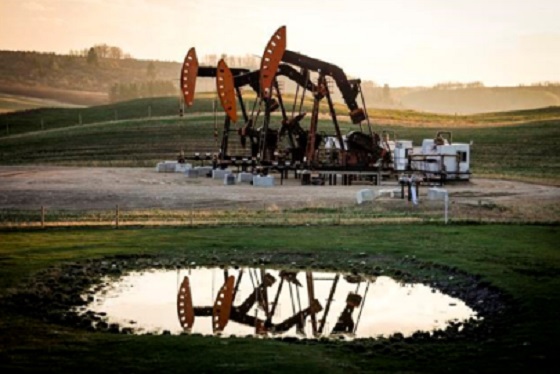Energy
The Next Canadian Federal Election Will Also be a Crucial Energy Issues Election

From EnergyNow.ca
By Maureen McCall
Since January 6, 2025, when Prime Minister Trudeau announced that he was stepping down as Prime Minister of Canada and announced that the Governor General had granted his request to prorogue Parliament, Canadians have been contemplating the fallout.
Terry Winnitoy, co-founder of EnergyNow.ca in Canada and EnergyNow.com in the US, wisely chose to bring together speakers from provincial and federal governments, as well as energy industry SMEs and an indigenous organization to discuss energy issues that will be part of this year’s 2025 federal election in Canada and crucial to Canada’s energy future; The Federal ‘Energy’ Election ’25 event was held at the Calgary Petroleum Club last week to a packed room.

The Federal ‘Energy’ Election ’25 Panel – From Left to Right : Greg McLean, David Yager, Rebecca Schulz, Kendall Dilling and Dale Swampy
Tracey Bodnarchuk CEO of Canada Powered By Women moderated the leaders’ panel which included Greg McLean Calgary Centre Federal Conservative MP, Rebecca Schulz Alberta Minister of Environment and Protected Areas, David Yager Senior Advisor to Alberta Premier Danielle Smith, Energy industry Entrepreneur and Author, Kendall Dilling, Pathways Alliance President and previous Cenovus Energy Vice-President- Environment & Regulatory, and Dale Swampy, President and founder of the National Coalition of Chiefs who is a board member and provides advisory services to The Canadian Energy Regulator (CER) and the Business Council of Alberta.
The discussion focused on the critical importance of the upcoming federal election, emphasizing the need for pragmatic, common-sense policies that will shape energy policies for decades to come.
Some of the Key points made by the panel included Canada’s significant role as the fourth-largest oil producer and fifth-largest natural gas producer, contributing 10% to GDP and $200 billion in exports. MP Greg McLean commented on how dramatically MPs in Ottawa have done a 180-degree pivot from their anti-fossil fuel stance of the last ten years.
“What I find ironic is the fact that you’ve got many eastern politicians- federal and provincial that are saying we need to use the oil industry as our trump card, and no pun intended,” McLean said.
“They’re actually trying to say this energy is very important. I can’t tell you how many years and how many speeches I’ve heard in the House of Commons about how we need to do away with this (Oil and Gas) industry as quickly as possible.
A wake-up call has happened. Now we recognize how important this industry is, as far as a job contributor, an economic contributor, and a taxation contributor to the Canadian economy. Now suddenly it’s the most important industry in Canada.”
The panel discussion highlighted the broad impacts of Trump tariffs and the need for pragmatic, common-sense policies that will shape energy policies for decades.
Minister Rebecca Schulz echoed the recent changes in energy discussions.
“Now we have to focus on energy security, affordability, our economy, jobs for everyday people, Schulz said. “We have to talk about that more now than we had in the past – when our federal government only wanted to talk about the environment and emissions. That is not a reasonable, rational conversation now, and it’s not what Canadians want to hear right now.”
She commented that the federal government has been problematic over the 10 years and said it was Premier Danielle Smith’s strong communications, advocacy and presence in the US and across North America – reaching out to policymakers south of the border that contributed to a reprieve in tariffs.
Dave Yager briefly described the market conditions that enabled misguided Federal govt policies over the last ten years.
“There were a lot of trends that took place from 2015 to 2019,” Yager said. “Interest rates were really low. Inflation was really low. They kept up with quantitative easing. The governments looked invincible. Renewables appeared to be penetrating because the cost was buried, and they never really realized what a contribution the collapse of oil prices made in 2015 to keep inflation down.
Why quantitative easing wasn’t inflationary until 2020 had a lot to do with the low price of oil and the low price of natural gas. That’s all changed. It started in 2020 and by 2022 when the Russian tanks went into Ukraine, all of a sudden we’ve got a whole different world. If you look around the world, a lot of people have changed direction. So I think there’s a growing realization that the platform that this government was elected on just doesn’t exist anymore.”
Kendall Dilling added his agreement that we are at “a palpable inflection point”. He saw a silver lining to all the challenges that he views as a wake-up call for Canadians.
“The question is, can we capitalize on it,” Dilling said. “and actually bring some change to fruition before we slide back into complacency?
When we talk about how we respond, there’s no scenario where we don’t remain intrinsically linked to the United States from a supply chain and energy perspective.
But we have become codependent. We slacked on our NATO and border commitments and other things. We’ve decided that only one issue mattered for the last decade, at the expense of the economy and we find ourselves in an unenviable position. Now the opportunity is in front of us to get a national consensus on the importance of the economy and actually drive some change.”
Dale Swampy stated that the Tariff issue has real relevance for the First Nations that the NCC represents as most of those Nations are located in Alberta and fully entrenched in the oil and gas industry.
He sees the importance of the impact on Canada and the U.S. as a driver for diversification to find new markets and he has experience in the fight to get pipeline project approval under the current processes. In 2010, he joined the Indigenous Relations team for the Northern Gateway Pipeline Project as Director of Indigenous Relations for the BC terrestrial region.
He worked with Indigenous community leaders to establish the Northern Gateway Aboriginal Equity Partners group or AEP – a group comprised of 31 Aboriginal community leaders working as part of an unprecedented partnership with Northern Gateway. It was after the cancellation of the project in 2016 that he started the National Coalition of Chiefs (NCC).
“I think it’s more important to understand that we have an opportunity now. It’s been nine years since they cancelled the Northern Gateway project. It’s been nine years since we have had an opportunity like this and can put the idea of building Northern Gateway and Energy East back on the table.
We want to advocate for the possibility of getting Northern Gateway launched again. If we get a First Nation-led project, we will support it. Now we have some leverage and we do have the ability to build it. So we’re working with a lot of the big six oil sands companies to say that we’ll put our name onto this and promote the Northern Gateway project.”
Swampy noted that with regulatory refinements, the pipeline could be built in a much more effective timeline than TMX.
The panel discussed specific projects like LNG expansion and the potential for more First Nations-led initiatives underscoring the urgency of rebuilding trust and attracting international capital to drive economic growth.
The discussion highlighted the challenges faced by Canada’s resource-based industries due to investor impatience with investors preferring more predictable returns, and favouring projects in the US (which are approved and built in much shorter timelines) over Canadian projects like LNG which become mired in regulatory red tape.
The comparison was made that Canada has only two LNG projects under construction compared to the US’s 25 billion cubic feet a day since 2015.
The panel addressed the current political instability with a parliament shutdown and a looming election. They emphasized the need for balanced policies that consider economic growth, energy security, and environmental responsibility but also shorten the overwrought regulatory process to get projects approved and built. They called for better communication and advocacy, particularly through social media, to influence public perception and policy.
MP Greg McLean summed up much of the sentiments of the panel saying:
“Oil is still going to be oil. Getting Canadian oil consumed in Canada, and getting a pipeline all the way through to New Brunswick makes all the sense in the world. Finally, the politicians are there. So maybe one of the things that we’ve seen in the last while about what the president of the United States has put on our table is the opportunity to cooperate to get the Canadian economy working coast to coast.”
Maureen McCall is an energy professional and Senior Fellow at the Frontier Center For Public Policy who writes on issues affecting the energy industry.
Energy
Carney’s Bill C-5 will likely make things worse—not better

From the Fraser Institute
By Niels Veldhuis and Jason Clemens
The Carney government’s signature legislation in its first post-election session of Parliament—Bill C-5, known as the Building Canada Act—recently passed the Senate for final approval, and is now law. It gives the government unprecedented powers and will likely make Canada even less attractive to investment than it is now, making a bad situation even worse.
Over the past 10 years, Canada has increasingly become known as a country that is un-investable, where it’s nearly impossible to get large and important projects, from pipelines to mines, approved. Even simple single-site redevelopment projects can take a decade to receive rezoning approval. It’s one of the primary reasons why Canada has experienced a mass exodus of investment capital, some $387 billion from 2015 to 2023. And from 2014 to 2023, the latest year of comparable data, investment per worker (excluding residential construction and adjusted for inflation) dropped by 19.3 per cent, from $20,310 to $16,386 (in 2017 dollars).
In theory, Bill C-5 will help speed up the approval process for projects deemed to be in the “national interest.” But the cabinet (and in practical terms, the prime minister) will determine the “national interest,” not the private sector. The bill also allows the cabinet to override existing laws, regulations and guidelines to facilitate investment and the building of projects such as pipelines, mines and power transmission lines. At a time when Canada is known for not being able to get large projects done, many are applauding this new approach, and indeed the bill passed with the support of the Opposition Conservatives.
But basically, it will allow the cabinet to go around nearly every existing hurdle impeding or preventing large project developments, and the list of hurdles is extensive: Bill C-69 (which governs the approval process for large infrastructure projects including pipelines), Bill C-48 (which effectively bans oil tankers off the west coast), the federal cap on greenhouse gas emissions for only the oil and gas sector (which effectively means a cap or even reductions in production), a quasi carbon tax on fuel (called the Clean Fuels Standard), and so on.
Bill C-5 will not change any of these problematic laws and regulations. It simply will allow the cabinet to choose when and where they’re applied. This is cronyism at its worst and opens up the Carney government to significant risks of favouritism and even corruption.
Consider firms interested in pursuing large projects. If the bill becomes the law of the land, there won’t be a new, better and more transparent process to follow that improves the general economic environment for all entrepreneurs and businesses. Instead, there will be a cabinet (i.e. politicians) with new extraordinary powers that firms can lobby to convince that their project is in the “national interest.”
Indeed, according to some reports, some senators are referring to Bill C-5 as the “trust me” law, meaning that because there aren’t enough details and guardrails within the legislation, senators who vote in favour are effectively “trusting” Prime Minister Carney and his cabinet to do the right thing, effectively and consistently over time.
Consider the ambiguity in the legislation and how it empowers discretionary decisions by the cabinet. According to the legislation, cabinet “may consider any factor” it “considers relevant, including the extent to which the project can… strengthen Canada’s autonomy, resilience and security” or “provide economic benefits to Canada” or “advance the interests of Indigenous peoples” or “contribute to clean growth and to meeting Canada’s objectives with respect to climate change.”
With this type of “criteria,” nearly anything cabinet or the prime minister can dream up could be deemed in the “national interest” and therefore provide the prime minister with unprecedented and near unilateral powers.
In the preamble to the legislation, the government said it wants an accelerated approval process, which “enhances regulatory certainty and investor confidence.” In all likelihood, Bill C-5 will do the opposite. It will put more power in the hands of a very few in government, lead to cronyism, risks outright corruption, and make Canada even less attractive to investment.
Business
The Passage of Bill C-5 Leaves the Conventional Energy Sector With as Many Questions as Answers

From Energy Now
By Jim Warren
Living with uncertainty can be worse than getting the bad news.
It’s been six months since Justin Trudeau resigned. Yet here we are little to no wiser about what Prime Minister Carney has in store for the oil and gas sector in the West. If Ottawa truly intends to pave the way for new pipelines, great! If not, it’s better to know now so we can get on with Plan B.
Those optimistic people who breathed a sigh of relief when the Building Canada Act (Bill C-5) became law are still at risk of disappointment. Bill C-5 might indeed herald a brighter future for Canadian gas and petroleum. But it’s also possible it will do nothing at all for the conventional energy sector.
The new law purports to be all about getting big development projects, that are in the national interest, more promptly approved than was the case when approvals were adjudicated under the auspices of the Impact Assessment Act (Bill C-69) and the tanker moratorium (Bill C-48).
Section 4 of the Building Canada Act states that its purpose “is to enhance Canada’s prosperity, national security, economic security, national defence and national autonomy by ensuring that projects, that are in the national interest, are advanced through an accelerated process that enhances regulatory certainty and investor confidence, while protecting the environment and respecting the rights of Indigenous peoples.”
Cabinet will have the final say on which projects will be considered for fast-tracked evaluation. Those lucky enough to be chosen are placed in Schedule 1. A project isn’t even in the game if it is not named and briefly described in Schedule 1.
The Act describes Schedule 1 as a list of projects seeking final approval. Providing the necessary information to appear on Schedule 1 seems pretty straightforward. Cabinet-anointed projects need only provide their name and the location of their principal activities and a brief description of what they intend to do. It almost seems too simple for projects purporting to advance critical national interests.
One of the big sticklers is that the Act is frustratingly opaque when it comes to specifically identifying what constitutes a national interest project (NIP). Subsection 5(6) provides a list of five conditions or goals that Cabinet might find relevant for the elevation of a project to Schedule 1. It doesn’t say a project has to meet all or any of those conditions—just that acceptable projects could include one or more of them. The wording is vague enough to suggest a project could include none of them, or include something nobody has thought of yet.
When deciding whether a project will be one of the lucky winners, the Act says Cabinet may consider any factor it considers relevant, “including the extent to which the project can:
(a) strengthen Canada’s autonomy, resilience and security;
(b) provide economic or other benefits to Canada;
(c) have a high likelihood of successful execution;
(d) advance the interests of Indigenous peoples; and
(e) contribute to clean growth and to meeting Canada’s objectives with respect to climate change.”
Smith makes the case
You certainly can’t fault Alberta Premier Danielle Smith for thinking a bid to get a million barrels per day Northern Gateway 2.0 onto Schedule 1 might succeed. The project clearly checks four of the five boxes, assuming they actually count. The new pipeline combined with plans for massive projects like the Pathways Alliance carbon sequestration initiative in the oil sands meets the contribution to climate change mitigation objective.
Check item “e”.
Speaking at Calgary’s Global Energy Show in early June, Smith explained a new million BPD oil pipeline running from Alberta to Prince Rupert has the potential to generate up to $20 billion in annual revenues. According to Smith, those new revenues will help make decarbonization projects like the Pathways Alliance plan feasible. Additionally, the new revenues will contribute to economic benefits for all Canadians, enhancing our ability to cope with the effects of US tariffs.
Check item “b”.
Alberta has taken significant steps to support First Nations participation in economically significant projects. Smith proudly points to the Alberta Indigenous Opportunities Corporation (AIOC) as an existing mechanism that will ensure Indigenous groups have a beneficial stake in energy projects and new pipelines.
Check item “d”.
No less important are the benefits the new pipeline will offer when it comes to Canada’s resilience as a resource exporting nation. Northern Gateway 2.0 will provide an outlet for exports to new international customers—as opposed to our heavy reliance on a single customer for almost all of our oil. If this doesn’t satisfy the goals stated in item “a” from the list, “strengthen Canada’s autonomy, resilience and security,” nothing can.
Check item “a”.
The likelihood that the project will succeed (as per item “c”) is a bit of a Catch-22. If the project is approved for Schedule 1, its chances for success are potentially good. If it is excluded they could be bleak.
Check “maybe” for item “c”
Assuming the federal government was being sincere when listing the five goals identified in Subsection 5(6,), getting industry players to sign on to the proposal is probably the most significant barrier to success.
This time might be different
Smith has said government and industry are, “working hard on being able to get industry players, private sector players, to realize this time might be different.” She’s optimistic that a private proponent or a consortium of companies will emerge to make a bid for approval.
Again, assuming the government is sincere about goals laid down 5 (6), the second most significant barrier is probably BC Premier David Eby’s, opposition to Northern Gateway 2.0.
The Building Canada Act is mute with respect to overriding the objections of a province to a project.
Smith recalls that Alberta was able to overcome opposition from the Government of British Columbia and obtain its approval for the original Northern Gateway project. She is confident that negotiations and common sense will prove successful this time around.
Danielle Smith doesn’t have stars in her eyes with respect to the chances for success. She simply recognizes what appears to be the opening of a window of opportunity. Considering the dearth of alternative options at the moment it makes sense to see if it’s real. If the opportunity proves illusive there are supporters of the oil industry in the West who will simply move on to Plan B. That option could include focusing Albertans’ disappointment and attention on the upcoming separation referendum.
It’s not the Cabinet who decides, it’s the PM and the PMO
Much of the foregoing assessment could be moot should Cabinet determine a new export pipeline is a bad idea. Unfortunately, there is cause to worry that if a proposal is made, it won’t be approved. Last week, for example, the Liberal government doubled down on one of its least successful, most impractical green transition initiatives – the EV mandate.
Mark Carney’s new environment and climate change minister, Julie Dabrusin, embarrassed herself in Question Period last week, by refusing to admit to any of the well-documented defects in the government’s handling of the Electric Vehicle and EV battery file. Bankrupt battery makers, Canadians’ reluctance to purchase EVs, and auto makers’ warnings about plant closures and huge job losses come to mind. Dabrusin appeared oblivious to any problems in these areas.
Julie Dabrusin isn’t the only climate-alarmed fanatic in cabinet, Steven Guilbeault is still there. Furthermore, most members of the current Liberal caucus are veterans of the Justin Trudeau caucus. These are the same people who backed the Liberals’ ten-year assault on conventional energy. The current Liberal cabinet and caucus are potentially just as environmentally pure as Justin’s. If so, they could prove reluctant to approve any new pipelines or override the tanker ban.
Some political commentators have expressed alarm over the powers Bill C-5 grants to Cabinet. The official decision making process grants the minister selected to oversee the Building Canada Act authority to make recommendations to Cabinet for which proposals should be advanced to Schedule 1. But, Cabinet is empowered to confirm or reject the proposals. Similarly, the minister responsible gets to provide Cabinet with recommendations for the final approval or rejection of projects listed in
Schedule 1. But, again Cabinet gets to accept or reject the recommendations.
The fact that these decisions can be made in the absence of parliamentary debate and media scrutiny has been cause for further alarm.
On the other hand, it appears opposition amendments approved by the House may have remedied some of the concerns about transparency. Omissions from the Bill such as the lack of transparency around conflicts of interest have been addressed. And, there will apparently be an effort to clarify exactly what the criteria for project approval actually are.
Nevertheless, efforts to lift the veil on the realities of government decision making may not count for much. Democracy at the federal level has long been eroded by the growing power of the Prime Minister’s Office (PMO). It is unlikely that the minister in charge of the Act or Cabinet members will do anything that runs contrary to the wishes of the PMO. Defy this rule and risk being booted from Cabinet. Protest too much and the prime minister could refuse to sign your nomination papers for the next federal election.
In the final analysis, the success or failure of a proposal for a new export pipeline touching on tidewater, will depend on what Mark Carney really wants. And who knows what that might be?
-

 Bruce Dowbiggin5 hours ago
Bruce Dowbiggin5 hours agoWhat Connor Should Say To Oilers: It’s Not You. It’s Me.
-

 Business6 hours ago
Business6 hours agoFederal fiscal anchor gives appearance of prudence, fails to back it up
-

 Business4 hours ago
Business4 hours agoThe Passage of Bill C-5 Leaves the Conventional Energy Sector With as Many Questions as Answers
-

 Alberta2 hours ago
Alberta2 hours agoAlberta poll shows strong resistance to pornographic material in school libraries
-

 Crime40 mins ago
Crime40 mins agoFlorida rescues 60 missing kids in nation’s largest-ever operation
-

 Banks3 hours ago
Banks3 hours agoScrapping net-zero commitments step in right direction for Canadian Pension Plan
-

 Alberta2 days ago
Alberta2 days agoAlberta’s government is investing $5 million to help launch the world’s first direct air capture centre at Innisfail
-

 Business1 day ago
Business1 day agoBehind the latest CPI Numbers: Inflation Slows, But Living Costs Don’t



